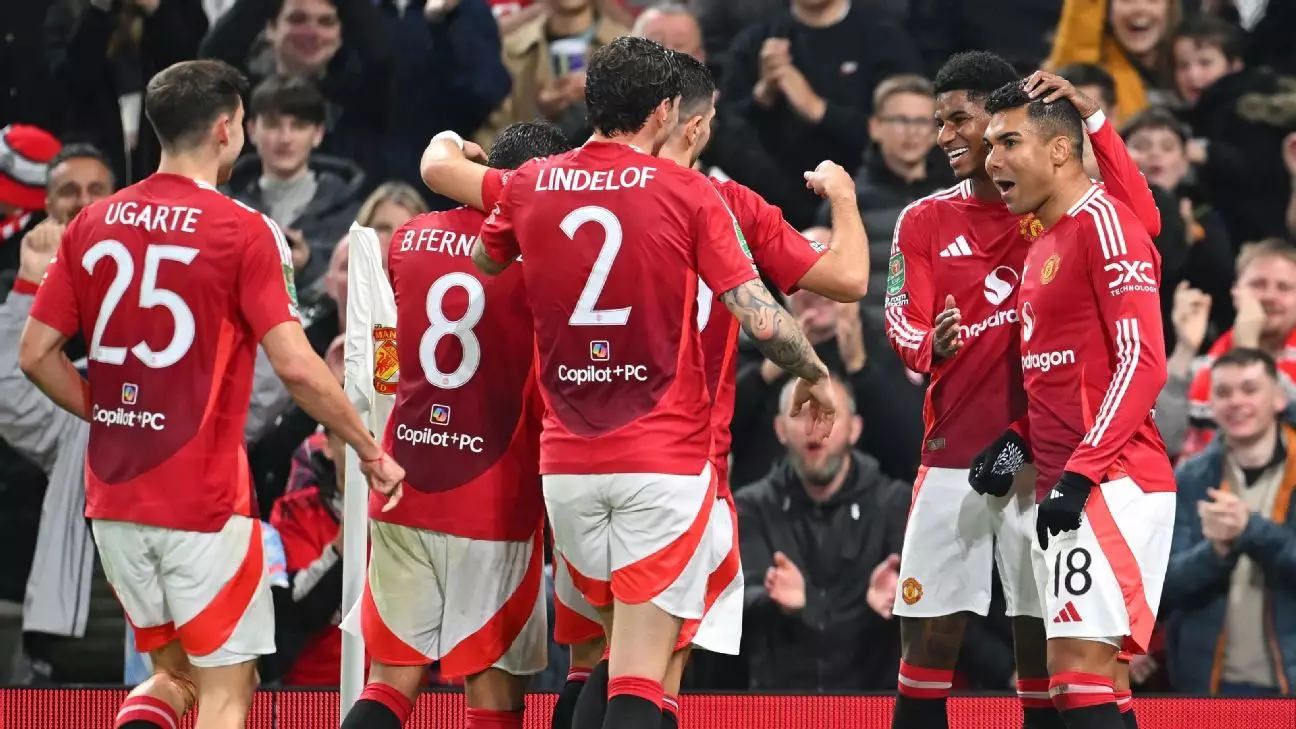The 2023 season for Manchester United has been marked by turmoil, evident in their current Premier League standing and managerial instability. The recent sacking of Erik ten Hag—a move that many in football circles debated—serves as a clear reflection of the team’s struggles. United’s inconsistency has reached a climax, with their throwback to a temporary manager, Ruud van Nistelrooy, evoking skepticism about the club’s leadership. While they managed a 5-2 victory against Leicester City in the Carabao Cup, the context renders this win less significant than it might seem. It reflects the underlying issues rather than resolving them.
The win felt strangely hollow, epitomized by the players’ lap of honor at Old Trafford. Were they seeking validation from the supporters, or was it merely the handling of a half-strength Leicester City team that disguised the true state of their performance? Winning should always generate a sense of pride and accomplishment; however, it can’t mask the deeper systemic issues that plague the club. A superficial victory often serves as a temporary antidote rather than a long-term remedy.
As United’s managerial woes continue, the pressure to find a sustainable solution intensifies. The current negotiations to lure Ruben Amorim from Sporting CP highlight a desperate urgency for stability. However, as history suggests, the club’s myriad managerial changes have seldom provided the much-needed impetus for success. Van Nistelrooy now becomes the ninth manager since Sir Alex Ferguson’s retirement—a staggering statistic that embodies the club’s failures both on and off the pitch.
What is strikingly evident is the ‘managerial bounce’ that traditionally follows the sacking of a coach. It appears to offer a convenient escape from the malaise, providing a false hope for supporters. However, the reality is that such initial success frequently fades, returning the team to its original lackluster state. The illusion persists, as seen in previous managerial tenures—a cycle that United fans, mystifyingly, have been forced to endure season after season.
Analyzing the performance against Leicester, the faults within the team structure remain exposed. Despite boasting notable performances from players like Casemiro, who scored two goals, and Bruno Fernandes, who showcased his leadership qualities, the victory was marred by defensive frailties. The shortcomings that plagued Ten Hag’s regime show little sign of vanishing. The defensive lapses against a half-quality opposition should serve as a warning bell for Van Nistelrooy and any future managers.
It raises important questions regarding the squad’s composition. The reliance on a few star players often masks the collective mediocrity that has characterized much of United’s play. Indeed, the depth and quality of the bench are paramount; while individual brilliance can shine through, it rarely translates into consistent results. Potential newcomers like Amorim must evaluate the current landscape carefully to ascertain which players can align with a renewed strategy and which need to be phased out.
Despite the fleeting joy of victory, the road ahead remains fraught with challenges. Manchester United fans can only hope that their team capitalizes on this temporary resurgence, but history suggests a more cautious optimism. While the match against Chelsea looms closer, the team must not forget the numerous instances of inconsistency that have haunted them. Is this brief moment of success merely a mirage, or could it signal a turnaround? The coming weeks will be crucial.
For the potential new manager, understanding the institutional dynamics, player psychology, and the disconnect that currently plagues the dressing room will be pivotal. There’s a dangerous precedence set: trusting in the remnants of a failing squad is unlikely to produce lasting change. Amorim’s task, should he take the helm, will be monumental. He must peel away the layers of underwhelming performances while revitalizing a squad that, even with talented players, has been unable to deliver on its potential.
Manchester United stands at a crossroads filled with uncertainty. Their history of managerial changes and inconsistent performances form a narrative rife with complications. The glow of a single win may provide temporary respite, but for a team with such high expectations, it will take more than a fluke victory against a weakened opponent to convince everyone that change is finally on the horizon. The real test for the players—and whatever coach ultimately arrives—will be the ability to sustain that momentum amidst the pressures of the modern game.

